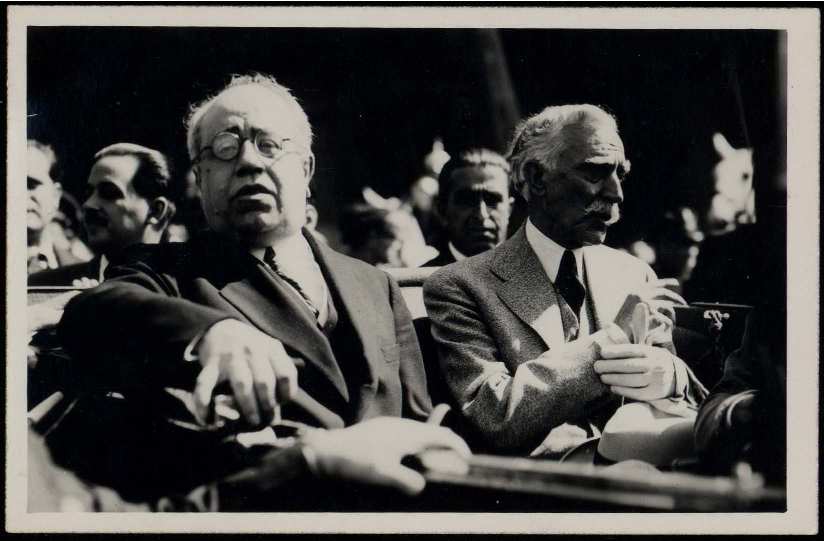Provisional government | Labour Movement Archive.
Proclamation of the Republic. Azaña in the Government: 1931-1933


Revista Estampa | National Library of Spain

The President of the Republic Niceto Alcalá Zamora with the Head of Government Azaña at the Book Fair (the first: April 1933) | General Archive of the Administration.

Inauguration of the Sorolla Museum. The Mayor, the Head of Government and the Minister of Public Education at the opening ceremony. 1932-06-11 | General Administration Archive.

The President of the Republic Niceto Alcalá Zamora at the inauguration of the Normal School of Teachers, on the occasion of the 2nd Anniversary of the Republic. Inauguration of the Pedagogical Museum. He is accompanied by the Head of the Azaña Government, the Minister of Public Instruction Fernando de los Ríos and the President of the Besteiro Congress. Inauguration of Blasco Ibáñez School Group. | General Administration Archive.

Laying first stone port of Bermeo 11 April 1933 | General Archives of the Administration.

Inauguration of the Baleares telephone line. The Head of Government, the Ministers of Governance and Communications and the Mayor. 1931-10-24. | General Administration Archive

Inauguration of the extension of the Castellana | Archivo Genrral de la Administración

Manuel Azaña with Francesc Maciá, president of the Government of Catalonia. | National Library of Spain.

Azaña with Éduard Herriot, French Prime Minister.

Khalifa of Morocco | Archive of the Workers Movement.

Azaña and Niceto Alcalá-Zamora at the Toledo Academy. | General Archives of Administration.

Visit of the Nuncio to Azaña to the Presidency of the Government. 15-10-1931 Nuncio Tedeschini, Azaña. | Archive of the Workers’ Movement.
In December 1930, after the uprising of Jaca, Azaña hides and begins to write Fresdeval, which leaves unfinished.
In the Provisional Government, presided over by Niceto Alcalá-Zamora, he is appointed Minister of War. It promotes the reform of the army and in October 1931, adds to the portfolio of Guerra the presidency of the Government.
In December 1931 the Constitution was approved, one of the most advanced of its time (it recognizes women's suffrage, the secularism of the State and "the renunciation of war as an instrument of national policy").
Azaña is confirmed as president of the government and begins his identification with the Republic, while the right-wing satirical press constantly denigrates him.
After overcoming the coup of General Sanjurjo, in August 1932, the Cortes approved the Statute of Catalonia and the Agrarian Reform Law.
His government launched an ambitious public works plan: it inaugurated new ministries and the extension of the Paseo de la Castellana, began the works of the Goloso barracks and the port of Bermeo, and created new bus lines and extensions of the Madrid metro.
There was also an intense cultural activity: the Pedagogical Missions were promoted, the Sorolla Museum and the Normal School of Teachers were inaugurated, the first Book Fair of Madrid was held and the work of different artists such as Antonia Mercé was recognized, La Argentina.
The Government did not neglect international relations either: it was present in the League of Nations, the first international body of the time, ties were forged with Morocco, whose Khalifa was received in Madrid, and the head of the French Government, Édouard Herriot, visited Spain in November 1932.
Words of Azaña
Spain renounces war as an instrument of national policy.
Article 6 of the 1931 Constitution.
On the institutional relationship Church-State:
Spain is no longer Catholic: the consequent political problem is to organise the state in such a way that it is suited to this new and historic phase of the Spanish people.
Session of Cortes, October 13, 1931.
About Catalonia:
The Republic without a republican Catalonia, would be a claudicating and weak Republic; but Catalonia without a liberal Republic like ours, would be much less free than it can be; so there are your freedom and the Republic, and the Catalan Republic and freedoms, indissolubly united: neither could exist without the other, nor would anyone attack the one, without immediately attacking the other.
… the implementation of autonomy in Catalonia, and soon that of other peninsular peoples in the modalities that are their own […] do not mean rupture […] is quite the opposite.
It is to base the collaboration […] on the desire to put the name of Spain and all its parts or personalities well articulated in the place where we are all obliged to bear the name of the small race that we all come from.
The Republic and the autonomy of Catalonia.
Speech delivered in the Plaza de la República. Barcelona, September 26, 1932.
On the Republican-Socialist conjunction:
… my experience of governing with the socialists is of interest to everyone, because if it were successful it would prove that the inevitable transformation of modern society can be made without the need for a revolution.
Memories. Annotation February 5, 1933 (Second Stolen Notebook).